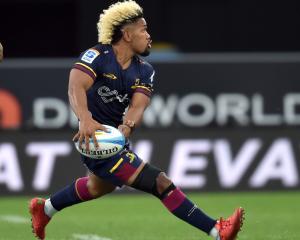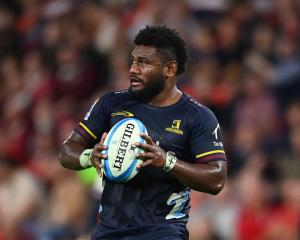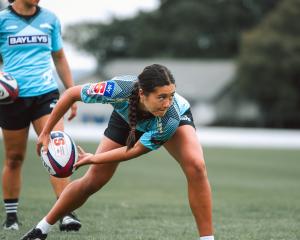
Their belief might have taken a hit from a heavy loss in the first test, but the Irish will win one of the next two tests against the All Blacks.
That is the opinion of former Highlanders captain Craig Newby — it should be noted he made his prediction of a 2-1 series victory to the home team before the first test at Eden Park — who has a reasonable insight into how the men from the Emerald Isle have risen to the top of world rugby.
Newby (42), who played his last game in New Zealand in 2008, has spent the past year working as skills coach at the Ulster club.
He has a keen interest in this tour, not only in how players from his own club perform, but in whether the Irish can continue their recent good form (three wins from five tests before the Auckland game) against the All Blacks.
The turning point was that famous day at Soldier Field in Chicago in 2016 when Ireland broke a 111-year hoodoo with their first win over the All Blacks.
"They got smart, and they scored smart tries, and they sucked the All Blacks into a few things," Newby told the Otago Daily Times from London recently.
"From there, it’s just been all about belief. This Irish team just believes it can beat the All Blacks, and that’s such an important part of sport.
"I think physically, they’ve been able to match the All Blacks. And athletically, Irish rugby has definitely improved. You’ve got these players who are massive but also fast."
The influence of Joe Schmidt, the former Irish coach now playing a role with the All Blacks, had also been significant, Newby said.
"They got serious about their coaching, and bringing in Joe Schmidt was a massive thing for them.
"I think Irish players in general now get better coaching week-in, week-out than perhaps they have had in the past.
"People ask me all the time and I think it just boils down to having good players with good coaching who believe they can win."
Ireland had also built excellent depth, Newby said.
The professional clubs were impressive organisations, former Brumbies coach David Nucifora was doing a fine job as the Irish union’s high-performance director, and more local players were getting exposure to top rugby as there were limits on how many foreign players could be recruited.
"It feels very similar to the New Zealand model. They want Irish players playing for Irish clubs, and they try to hold on to all their best players.
"The school system is also delivering some really good rugby players.
"Irish rugby players are very passionate, and they play smart rugby, and clubs like to get the players involved in working out game plans and that sort of thing.
"And they are tough people. They work hard. And when intelligence gets mixed in with hardness and heart, it really works."
On the flip side, Newby had some concerns about the All Blacks heading into this series — keeping in mind he spoke before the impressive performance at Eden Park.
Most critics zeroed in on the season-ending losses to Ireland and France last year as proof either Ian Foster was not the right man to be coaching the team — or a formerly all-conquering team had lost its mojo.
Newby, however, felt those defeats were as much to do with the length of the season as anything else.
He remains more perturbed by the recent memory of seeing the All Blacks dud out at the 2019 World Cup.
"They fell off the pace. They were out-coached and out-thought, and didn’t have a plan B, and got smashed against England.
"It’s hard to say but it feels like maybe they got a bit arrogant and thought, well, we’ve scored five tries a game for 100 years and why would we change anything?
"I think other countries have looked outside the box and got better and evolved quicker. And I think the All Blacks got a bit stagnant and thought what they were doing was going to be good enough."
He was not convinced the All Blacks tight five was good enough to compete with the elite teams, particularly the dominant French.
"The front row is not anywhere near as good as it was. They’ve got a lot of props, but I don’t think there are any guys really at the top level.
"I just don’t think the set piece is where it needs to be. And they need to get proactive in getting ahead of the game and learning from others.
"We need to be convinced the All Blacks are developing and evolving. Otherwise it feels like we will go to a World Cup just hoping we’re are going to have a good day."
Nevertheless, Newby thought the All Blacks were doing the right thing by not panicking and desperately trying to do new things a year out from another World Cup campaign.
They needed to work with the players they had and settle on a squad that gave them the best chance of winning.
He rates the Irish maul, and is a particular fan of flanker Josh van der Flier, but is not yet willing to say Ireland is one of the favourites for the 2023 World Cup.
"I think they are potentially good enough to win a World Cup. On paper, at least.

Newby was a classic rugby refugee.
He grew up in Rotorua — he scored the only try for Rotorua Boys’ High School when it drew 5-5 with Otago Boys’ in the national First XV final in 1998 — and he took his early steps in elite rugby for North Harbour, before shining for Otago and the Highlanders.
Home is now Surrey, where Newby lives with English wife Dominique before he decamps to Belfast during the season with Ulster.
His coaching life evolved organically. After doing some academy work with the Harlequins and Wasps clubs, and stints with the England under-20 women’s team and in Japan with former Highlanders coach Greg Cooper, he found himself director of rugby at a private school, St John’s Leatherhead, in London.
That was a fun five years, and Newby had offers from New Zealand schools to fulfil similar roles, but he felt the desire to return to the professional rugby ranks.
"I was enjoying the school but felt it was time for a change, and I felt I’d regret it if I didn’t try to coach as high as I could.
"I love it at Ulster. I guess I’m not what you would call a typical skills coach — a lot of them are former backs — but maybe I can offer something a little bit different."
Newby has signed a new two-year deal with Ulster, where he works alongside former Dunedin Sharks fullback Dan Soper, who is the attack coach.
Is he ambitious to keep moving up the coaching ranks?
"I’m very goal-oriented, and I want to keep getting better. As a coach, I’m not sure. I’m just happy, and really comfortable with where I am.
"Sometimes you just need to enjoy where you are and take it for what it is."
Newby would relish a chance to coach in New Zealand but his family life is settled.
His wife works in the city, and daughter Olivia (16) has a year to go at high school and is planning to go to university in England.
Home is still home, though, and he holds nothing but fond memories of his time in Dunedin, where he played 67 games for the Highlanders and 38 games for Otago between 2002 and 2008.
Newby remembers turning up as a young buck and being in awe of the players around him at the tail end of a great era for the Highlanders.
"That first year, we had an unreal team. I remember day one, a round of golf at Balmacewen. I was paired with Jeff Wilson and I’m just thinking, man, Jeff Wilson.
"We made the semifinals that year and I’m just thinking, wow, I want to be here forever.
"Then I guess those guys like Browny (Tony Brown), Goldie (Wilson), Simon Maling and Kelvin Middleton sort of transitioned out of the team, so we lost a lot of that real experience."
Newby quickly became a leader in a new-look Highlanders team with plenty of good players — think Nick Evans, Tom Donnelly, Seilala Mapusua, Jimmy Cowan and the like — but not the real star power of the late 1990s.
The Highlanders would be decent but not great for the rest of his time in the South. But Newby, who made three appearances off the bench for the All Blacks, loved every minute.
"It felt like we were trying to punch above our weight. Maybe we got left behind a bit for three or four years, on reflection, and other teams went ahead.
"I wouldn’t change a thing, though. We had a great culture. And I’m still best mates with guys like Tom and Jamie Mackintosh, and I speak to Maps (Mapusua) and Neil Brew and Glen Horton.
"Would we have liked to be more successful with the Highlanders? Yeah, of course.
"But that doesn’t change how much we loved the Highlanders and loved rugby so much that a lot of us are still in rugby. Look how many coaches came out of those teams."
Newby then spent four years playing for English club Leicester before post-surgery knee issues prompted him to retire at 32.
"I had a pretty good run. I’d done some significant things and achieved quite a bit.
"Maybe achieved is not the right word, but I’ve certainly done a lot of stuff. I’m proud of the fact I went out and did a few things."
Newby has a Leicester jersey hanging on the wall in his dining room, an All Black jersey in his Belfast home, and his gold medal from sevens at the 2002 Commonwealth Games in his drawer.
Otherwise, the priority when it comes to trophies is the latest deer head claimed by the passionate hunter.










